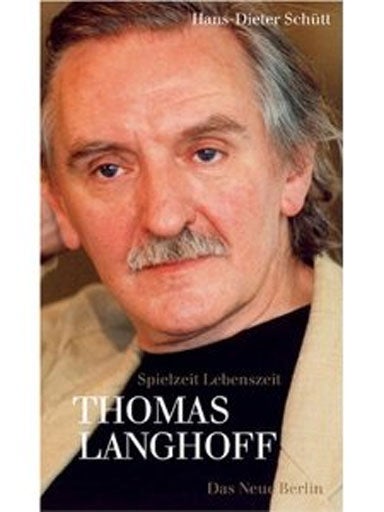
Your support helps us to tell the story
From reproductive rights to climate change to Big Tech, The Independent is on the ground when the story is developing. Whether it's investigating the financials of Elon Musk's pro-Trump PAC or producing our latest documentary, 'The A Word', which shines a light on the American women fighting for reproductive rights, we know how important it is to parse out the facts from the messaging.
At such a critical moment in US history, we need reporters on the ground. Your donation allows us to keep sending journalists to speak to both sides of the story.
The Independent is trusted by Americans across the entire political spectrum. And unlike many other quality news outlets, we choose not to lock Americans out of our reporting and analysis with paywalls. We believe quality journalism should be available to everyone, paid for by those who can afford it.
Your support makes all the difference.Thomas Langhoff was one of the most important theatre directors in the German-speaking world. Working in East Germany, he remained in demand after the Berlin Wall came down. He was particularly celebrated for his work on the great playwrights, the likes of Shakespeare, Goethe, Schiller, Ibsen, Shaw and Chekhov.
Langhoff was born in 1938 in Zurich, where his family had fled from the Nazis. His father, Wolfgang became a well-known actor and director who joined the Communist Party in 1928. Arrested by the Nazis in 1933 and sent to Esterwegen concentration camp, he was among those released in the Easter amnesty of April 1934. Thomas's mother, from a Jewish family, was the actress Renata Edwina Malacrida. Both were active in Communist-exile politics and remained loyal despite the doubts they experienced during the Hitler-Stalin pact of 1939-41.
In 1945 the family returned to Germany, settling in East Berlin,Wolfgang becoming director of the prestigious Deutsches Theatre and rising in the ruling Socialist Unity Party (SED). But in 1950, he was caught up in a Stalinist purge. With the help of Brecht, he held on to his theatre career and was rehabilitated in 1956.
For Thomas, who was eight when the family returned to Berlin, the city was a shock after neutral, prosperous Switzerland – especially the ruined streets, empty shops and the many disabled ex-servicemen. But he had a privileged life: the family lived in a villa with Bertolt Brecht and Helene Weigel as neighbours. He later wrote that his mother enjoyed luxury, including fine cuisine, but sadness and anxiety were constant companions. These former émigrés were not sure how they were regarded by the ordinary Germans whom they often saw as, at best, fellow travellers of the Nazi regime – and they had to mix with former Nazis and Wehrmacht officers, who were given respectable places in East German society.
Langhoff followed his parents into the theatre and studied at the theatre school in Leipzig until 1960. From 1963 he was an actor at the Hans Otto Theater in Potsdam. During this period he also started acting in films and on television – from 1971 to 1977 he worked full-time in television. He became director of the Maxim Gorki Theatre in East Berlin and from 1979 he freelanced and was able to make a name for himself outside the Soviet bloc, in Frankfurt, Munich and Vienna.
Langhoff scored with the classics: among his best-known productions were his stagings of Schiller's Maria Stuart (1980), Sean O'Casey's The Bishop's Bonfire (1982), Ibsen's Ghosts (1983) and Shakespeare's Merchant of Venice (1985). His last production was Chekhov's The Cherry Orchard, which opened four months before his death. Of course, the classics were the safe option in a state ruled by the SED; perhaps he saw Brecht and others like him as relatively superficial by comparison. Indeed, his first Brecht production, The Caucasian Chalk Circle, didn't come until 1998. Langhoff said he believed that "Art cannot exist unless, now and again, it makes clear that injustice exists in the world."
Langhoff did put on a very contemporary play at the Maxim Gorki Theater in 1988 – Volker Braun's Übergangsgesellschaft ("Transitionary Society"). Written in 1982, it could only be performed under the growing influence of Gorbachev's glasnost. Set in a decaying villa confiscated from a Nazi war profiteer and occupied by the family of a deceased SED functionary, it seemed to articulate the sorry state of the GDR. Within months the Berlin Wall was opened. In 1989 he produced Brendan Behan's The Hostage, and in the same year he went to Frankfurt am Main to put on Benjamin Britten's opera A Midsummer Night's Dream.
Langhoff remained in demand after the fall of the GDR. From 1991 he headed the Deutsche Theatre in Berlin, where he, and his father before him, had previously worked as a director. He was bitterly disappointed when his contract was not renewed, apparently for political reasons, in 1991.
Among his last productions were Eugene O'Neill's A Moon for the Misbegotten (2009) in Munich, and Tennessee Williams' A Streetcar Named Desire (2011) in Berlin. His sons, Lukas and Tobias, both sought careers in the theatre.
David Childs
Thomas Langhoff, actor and director: married (two sons); born Zurich 8 April 1938; died Berlin 18 February 2012.
Join our commenting forum
Join thought-provoking conversations, follow other Independent readers and see their replies
Comments